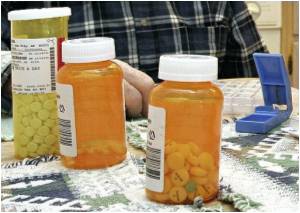Scientists say a newly developed drug has the potential to stop a debilitating condition of diabetes that often leads to pain in the extremities and even amputations.

The researchers have found that KU-32 can stop and even reverse diabetic peripheral neuropathy, or DPN, in mice.
The condition leads to death of nerves in the extremities of individuals with diabetes.
"People with DPN can be very sensitive to light touch, which can cause significant pain," said Rick Dobrowsky, one of the paper's authors.
"The other side is eventually diabetes causes death of the nerves. DPN often leads to loss of feeling in the hands and feet, which can make diabetics susceptible to wounds and infections and often leads to amputations of toes and feet," he said.
The researchers administered KU-32 to diabetic mice. The compound stopped DPN and showed it could restore sensory neuron function to damaged nerve tissue. KU-32 inhibits a specific member of a family of proteins called molecular chaperones.
"Our tests so far indicate that KU-32 is completely nontoxic and is absorbed in the blood stream very well," said Brian Blagg.
Source-ANI
 MEDINDIA
MEDINDIA



 Email
Email










